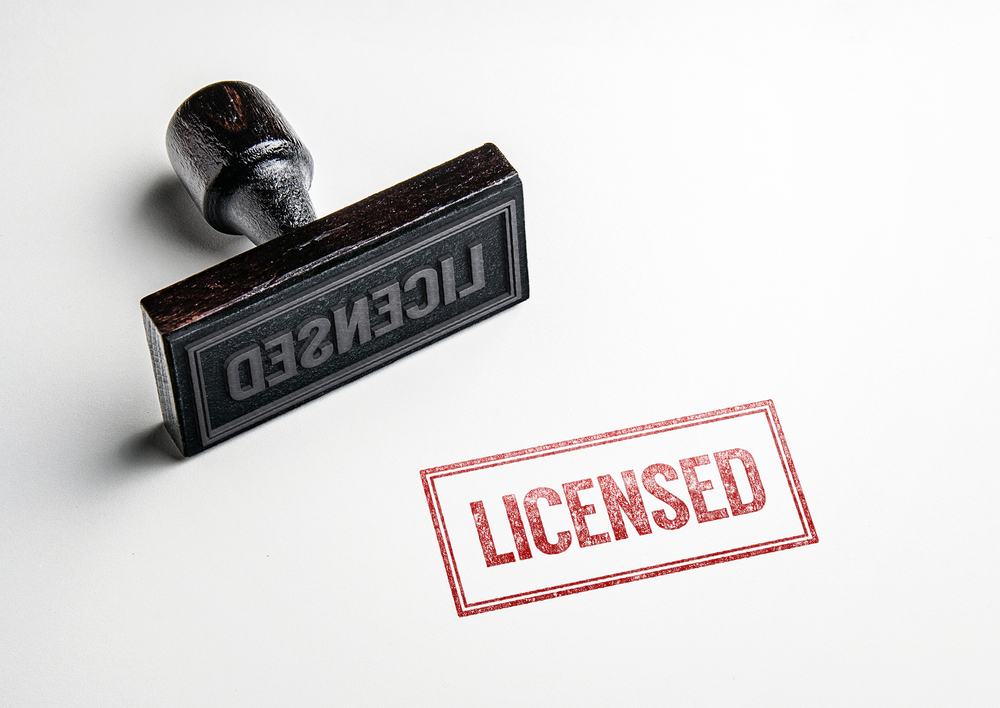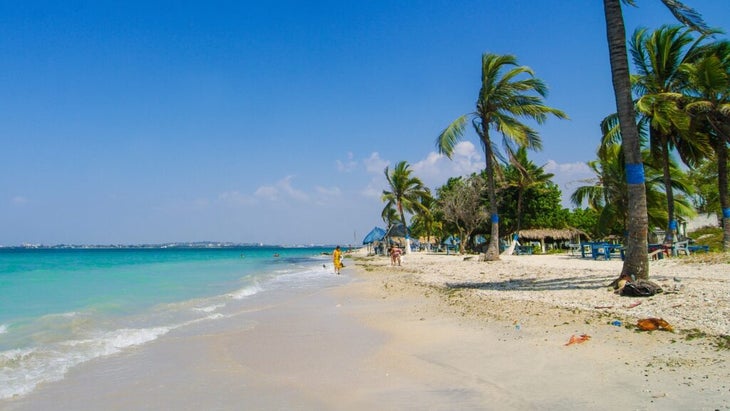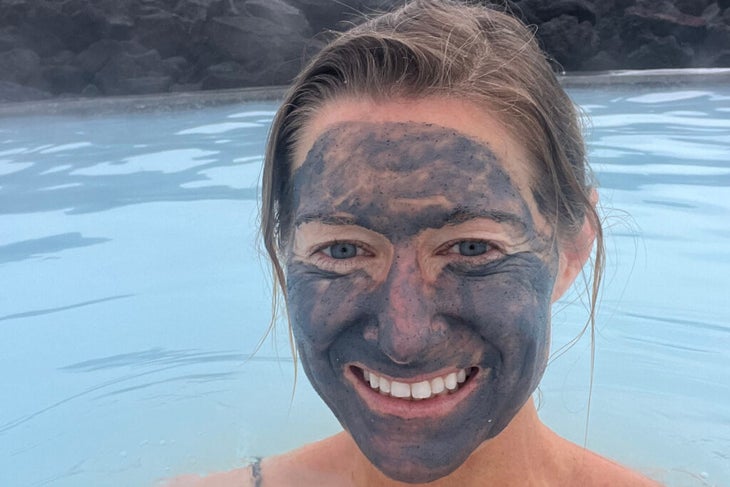
- The Benefits
- Custom Franchise
- Plans & Pricing
- Our Mission
- Testimonials


An Overview On Travel Agent Licensing Requirements In The USA and Canada Go Back Button

You are considering becoming a professional travel agent, so you start doing your research on all the things you need to start selling travel. One of the things you may research or come across is licensing. Do you need licensing to start selling travel? The answer to that question is broken down below to hopefully provide you with the clarity you need to move forward.
Travel Agent Licensing Requirements For Travel Agents In The United States
The licensing requirements in the US for travel agents is not much of a licensing process. There are no testing, training or qualification process needed. All that is required is to complete a simple form, pay a small fee and just like that, you can start selling travel in the USA. There are certain states however that have their individual "Seller Of Travel Requirements." These states are California, Florida, Iowa, Washington and Hawaii. We will look at the individual licensing requirements for those later on in this article for those looking to trade in travel products and services in any of those 5 states.
Travel Agent Licensing Requirements For Travel Agents In Canada
Selling travel legally in Canada is not so easy as in the US. This is especially so for those living in the province of Ontario. Anyone selling travel products and services in the Province of Ontario must be a registered member of the Travel Industry Council Of Ontario (TICO) or affiliated with a registered member of TICO. There are two different types of TICO registration requirements. If you are looking to start your own travel agency, you must complete the TICO application, qualification, training and registration process to obtain a TICO registration number. If you are looking to simply sell travel, you must first complete the TICO Exam then join a TICO registered travel agency.
So here are the requirements for Travel Agents and Agencies In Ontario
A) Travel Agency must be TICO registered with a TICO number to employ or host travel agents.
B) All members of that Travel Agency, selling or giving advice for travel services, must complete the TICO Exam.
To write the TICO Exam, you must first download and read the TICO education standard manual. This manual provides you with a list of rules, guidelines and etiquette you must follow when selling travel in the province of Ontario. Once you have completed the manual, which should take no longer than one to two weeks, you then need to register for exam at one of the approved centers. You can find a list of upcoming exams on the ACTA (Association Of Canadian Travel Agents) website. The course registration fee is only $35, and there are a few courses you can take. You can either take the Travel Counselors course of if you have and can show experience in the industry you can take the travel manager/supervisor course. The combined courses will cost you $50.
To run your own TICO registered travel agency is not as easy and cost friendly as completing the exam to sell travel through an agency that is already certified. If you are thinking of starting your own TICO registered travel agency, here are the list of requirements:
- You will need to come up with an application fee of $3000 CDN
- You must provide your tax returns to show proof of financial stability
- You will need to show evidence of a minimum $5000 in working capital
- You will need to provide a $10,000 bond that TICO will hold for two years
- You will need to open a trust account where all funds you collect for travel must be held.
- You will need to register your travel business with Service Ontario
TICO registration numbers are non-transferable, so there are no options to buy out an already existing TICO certified travel agency. Starting a travel agency in the province of Ontario is among the hardest if not the hardest in the industry, so if you are new to the business and you are living in Ontario, the easiest thing to do is work through a host agency that is already TICO certified.
British Colombia Travel Agency Licensing Requirements
To start a travel agency in British Columbia, Canada, you are required by the Insurance Council of British Colombian to take a travel insurance exam for a fee of $225 per year. That licensing will be tied to the Agency, and each agent will be required to take the exam once, and then maintain by taking a 2-hour course each year. A 2-year lapse or non-activity will require the agency to start the process all over again.
There are some additional fees and certification requirements for sellers of travel residing in British Columbia.
- You must register with the BC Corporate Registry
- You must register with Consumer Protection BC
If you are a hosted agent working under an Agency located in BC, you will need to apply for a branch location of your host agency in British Columbia.
Saskatchewan Colombia Travel Agency Licensing Requirements
Similarly to British Colombia, getting licensed to sell travel in Saskatchewan Canada is insurance based. The tow exams that’s required to be written and passed are the General Insurance Council of Saskatchewan (GICS)—the Qualifying Exam (online: $109 CAD + taxes) and the Travel Bylaw Exam (online: $55 CAD + taxes). The bylaw exam is an open book exam, so you do not need to worry too much about passing it.
US Travel Agency Licensing Requirements Per State
Even though getting your travel business up and running on the national level in the United States is pretty much hassle free, some states have implemented their own registration procedures that may make things a little bit more complicated. 5 States have their own Seller of Travel laws in place. Those states are California, Florida, Washington, Iowa, and Hawaii. These laws are what is called extraterritorial laws that do not just apply to those residing in the above-mentioned states, but those outside of the states selling travel to the residents of those states.
In the State of Delaware, if you plan on opening your travel agency there, you will need an occupational license that can be obtained for the nominal fee of $25. The same procedure is said to be in Lousiana but does not seem to be enforced. When it comes to Seller Of Travel licensing requirements, Louisiana and Delaware are hardly mentioned. It is the 5 primary states mentioned above that is worth paying close attention to.
Hawaii Seller Of Travel Requirements
Hawaii Seller of travel laws states that anyone acting as an intermediary between a person looking to buy travel products and services, and anyone that wishes sell travel products and services, must first register with the Hawaii Travel Agent Licensing Program. All travel agencies, chartered tour operators residing in Hawaii is required to register at the end of each odd-numbered year. The bi-annual registration fee is $140. For those living outside of the State of Hawaii but wish to do business in Hawaii, must apply for a Certificate of Authority to sell trade in travel products and services in the state of Hawaii. The registration cost is $25 per year. For full details of these and other requirements, contact the Department of Commerce and Consumer Affairs.
California Seller Of Travel Requirements
Anyone that sells, offers consultation, or offers travel products and travel-related services in the state of California or from n office located in California, is required to be registered as a California Seller Of Travel. This is also including anyone selling or distributing travel certificates, a coupon, vouchers, passes, are all required to comply with the California State Seller Of Travel Laws. Failing to register may result in penalties, a cease and desist order and the possibility of criminal charges.
There are two registration programs for travel businesses located in California. Once is the Travel Consumer Restitution Corporation which manages the handling of customer funds and the other is the California Seller Of Travel Program (CST) that is administered and upheld by the California Attorney General. Out of state agencies are only required to register for the CST. The California seller of travel law is strictly enforced and travel agencies conducting business are required to display their CST number on any marketing material promoting of offering travel services in the State of California.
Florida Seller Of Travel Requirements
In the sate of Florida, anyone seeking to sell travel products or travel related services must register with the Department of Agriculture of Consumer Services. The Seller Of Travel registration requirements applies to all persons offering pre-arranged travel packages, tourist related services, guided tours for Land, Air and Sea.
The state requires a bond of $50,000 and extensive disclosures in order to obtain a Seller Of Travel license. Independent travel agents are not required to post the bond but must meet the other mandatory requirements.
Iowa Seller of Travel Requirements
It is a requirement in the state of Iowa that all sellers of travel register with the department of Economic Development. This applies to anyone selling or offer consultation for travel products and travel-related services.
Washington Seller Of Travel Requirements
The State of Washington has a seller of travel registration requirement done through the Department of Licensing. There are also certain financial requirements and securities that needs to be in place. A travel business can become exempt from these fees is certain business standards are met and funds and consumer funds collected for travel are being held properly.
When looking to get licensing to sell travel, the best thing to do is thoroughly research the laws in your local area. This is another place where the value of a Host Agency comes in. By contacting a host agency, they will not only be able to save you time and money of the licensing and registration process; they will be able to provide you with a lot of the information you are looking for.
- Privacy Policy
All Rights Reserved The Travelnet Inc.

- Find a Lawyer
- Legal Topics
- Business Law
- Business Disputes
Understanding Travel Agent Liability
(This may not be the same place you live)
Are Travel Agencies Subject to Specific Laws?
Yes, travel agencies and travel agents are subject to specific laws. A travel agency is a business that makes arrangements for individuals who are traveling, including booking airline tickets and hotel rooms.
Travel agencies and their agents are subject to travel law. Travel law regulates the travel industry. Travel law includes:
- Federal laws;
- State laws;
- Common law; and
- International laws.
Each state has consumer disclosure and fraud statutes as well as refund policy requirements for businesses that arrange and/or sell travel services. Some states have created specific laws for regulation, registration, and licensing for those who sell travel. The majority of states do not require travel agents to obtain a license. However, California and Florida require travel agents to register with the applicable state agency.
What are the Responsibilities of Travel Agents?
What are the legal duties and obligations of travel agents, what is travel insurance, is trip insurance required, can my travel agent be liable for problems i encounter on my trip, do travel agents need insurance, do i need a lawyer if i have a claim against my travel agent.
Travel agents have many responsibilities. A travel agent definition is someone who sells and arranges transportation, accommodations, tours, and/or trips for travelers. They are fiduciaries , or representatives, of their customers. They are responsible for general duties in arranging travel plans. A travel agent should:
- Make and confirm reservations, including itinerary changes and delivery of tickets;
- Disclose the identity of tour operator and/or the supplier responsible for the services;
- Vouch for the reliability of the supplier and/or provide a warranty for services;
- Investigate the availability of travel services, such as cancelled flights and/or overbooked hotels;
- Convey needed information and provide needed travel documentation;
- Provide information on health and safety hazards;
- Advise on the availability of travel insurance ; and
- Inform customers of any restrictions on transportation tickets.
According to the state courts, travel agents have a higher standard of care because they have a special relationship with their customers. This includes special duties and obligations owed to their customers. Travel agents duties and obligations include:
- A duty to warn the customer;
- A duty to investigate and disclose;
- A duty to inform;
- A duty to make reservations; and
- A duty to confirm reservations.
The duty to warn the customer includes a duty to reveal any negative information they have regarding the destination of the traveler. An example of this is if the traveler is going to a high crime area.
The duty to investigate and disclose includes a duty to investigate travel plans and be knowledgeable about the area to which the traveler is going. This includes knowing if there are certain conditions that would affect the consumers travel plans, such as a community event that may cause travel interference or delays.
The travel agent’s duty to inform means the agent has a duty to inform their clients about important travel information. They must inform clients about things such as:
- Limitations on ticket changes;
- Documents needed to travel;
- Whether certain countries have requirements; and
- The availability of travel insurance.
The travel agent has a duty to make reservations at the request of the customer. The travel agent also has a duty to confirm those reservations and make sure they are ready for the customer.
Travel insurance reimburses a traveler for costs related to events that may occur during their trip. It is designed to cover those who purchase coverage for financial implications of issues that may arise during their trip. It may include costs incurred prior to travel, such as non-refundable tickets or hotel stays and/or events that occur during a trip, including travel interruptions and medical expenses.
Travel insurance usually covers 5 main categories, including:
- Trip cancellations;
- Travel medical coverage;
- Major medical coverage;
- Emergency medical evacuation; and/or
- Accidental death/flight accident.
Travel insurance is an optional coverage that the traveler can purchase when they book their trip. Should they wish, a lawyer can review the terms and conditions of any travel insurance.
As noted above, trip or travel insurance is an optional coverage a traveler may purchase prior to taking a trip. In most cases, an individual’s homeowner’s insurance and/or health insurance policies will cover any medical costs or lost property, while at home or traveling. An individual’s life insurance policy will usually cover the individual and their family members while traveling. Additionally, airlines must reimburse a passenger if they lose their baggage.
A traveler can also purchase trip cancellation or trip interruption insurance, which will cover any losses that are not covered by other insurance. This can be helpful to protect the cost of the trip, especially if it must be cut short due to unforeseen circumstances.
Travel can be extremely expensive, especially abroad. Trip insurance may assist with costs of travel delay and/or lost or damaged luggage if the airline fails to fully compensate the traveler. It may also protect a traveler from costly medical bills in the event they are injured or become ill during their trip. Trip insurance may cover extreme unforeseen circumstances such as emergency medical evacuation, accidental death and/or flight accidents.
There are times when travel agents may be liable for problems a customer encounters. Travel agents may be liable to their customers for:
- Violations of general duties;
- Fraudulent misrepresentations; and/or
- Violations of applicable state regulations.
Some common issues travelers may encounter include:
- A cancellation;
- Discrimination;
- Lost, stolen and/or damaged baggage;
- A violation of consumer protection laws; and/or
- A deceptive port charge.
Sometimes, when an individual books a vacation, they may have to sign a travel agency contract. These contracts are signed at the time the traveler books their trip. They may include:
- Baggage fees;
- Travel agent obligations;
- Cancellations;
- Payment terms;
- Additional fees;
- Travel documents;
- Confirmations;
- Governing laws; and/or
- Any other necessary clauses.
Yes, similar to other commercial businesses, travel agents benefit from obtaining business insurance to protect them from liability. Travel agent or travel agency insurance often comes in 2 forms: professional liability insurance and general liability insurance.
Travel agent liability insurance, or professional liability insurance, protects a travel agent for any errors that occur in business activities. It also assists when the travel agent is sued by a customer for not providing the service that the customer was due to receive per their contract.
General liability insurance protects travel agents and travel agencies in their officers where they meet with clients. This is generally for protection in case a claim related to an injury, such as a slip and fall accident, occurs.
Yes, travel laws can be complex and vary by jurisdiction. An experienced business lawyer will be able to assist you with any aspects of travel law. Every state has specific regulations regarding travel sellers. Travel law includes domestic and international laws. For these reasons, it is important to obtain the services of a lawyer to help navigate any claims.
A lawyer can assist with reviewing any contracts and/or documentation and determine if a claim exists. A lawyer can also represent you during any court proceedings or alternative dispute resolution processes, if necessary. A lawyer can also assist you with any issues that arise from travel insurance.
Save Time and Money - Speak With a Lawyer Right Away
- Buy one 30-minute consultation call or subscribe for unlimited calls
- Subscription includes access to unlimited consultation calls at a reduced price
- Receive quick expert feedback or review your DIY legal documents
- Have peace of mind without a long wait or industry standard retainer
- Get the right guidance - Schedule a call with a lawyer today!
Need a Business Law Lawyer in your Area?
- Connecticut
- Massachusetts
- Mississippi
- New Hampshire
- North Carolina
- North Dakota
- Pennsylvania
- Rhode Island
- South Carolina
- South Dakota
- West Virginia

Jennifer Corbett
LegalMatch Legal Writer
Original Author
Jennifer joined LegalMatch in 2020 as a Legal Writer. She holds a J.D. from Cumberland School of Law and has been a member of the Alabama State Bar since 2012. She is a certified mediator and guardian ad litem. She holds a B.A. in Criminology and Criminal Justice and a B.A. in Spanish, both from Auburn University. Jennifer’s favorite part of legal work is research and writing. Jennifer enjoyed being a Law Clerk for a distinguished Circuit Judge in Alabama. She is a stay-at-home mom and homeschool teacher of three children. She enjoys reading and long evening walks with her husband. Read More

Jose Rivera
Managing Editor
Preparing for Your Case
- What to Do to Have a Strong Business Dispute Case
- Top 5 Types of Documents/Evidence to Gather for Your Business Dispute Case
Related Articles
- Equal Credit Opportunity Act Lawyers
- Truth in Lending Act
- How to Sue a Company in North Carolina?
- How to Sue a Company in Iowa?
- How to Sue a Company in Wyoming?
- How to Sue a Company in Vermont?
- How to Sue a Company in Alaska?
- How to Sue a Company in North Dakota?
- How to Sue a Company in South Dakota?
- How to Sue a Company in Delaware?
- How to Sue a Company in Rhode Island?
- How to Sue a Company in Montana?
- How to Sue a Company in Maine?
- How to Sue a Company in West Virginia?
- How to Sue a Company in New Hampshire?
- How to Sue a Company in Hawaii?
- How to Sue a Company in New Mexico?
- How to Sue a Company in Mississippi?
- How to Sue a Company in Kansas?
- How to Sue a Company in Arkansas?
- How to Sue a Company in Nevada?
- How to Sue a Company in Kentucky?
- How to Sue a Company in Louisiana?
- How to Sue a Company in Idaho?
- How to Sue a Company in Nebraska?
- How to Sue a Company in Connecticut?
- How to Sue a Company in Oklahoma?
- How to Sue a Company in Oregon?
- How to Sue a Company in Tennessee?
- How to Sue a Company in Arizona?
Discover the Trustworthy LegalMatch Advantage
- No fee to present your case
- Choose from lawyers in your area
- A 100% confidential service
How does LegalMatch work?
Law Library Disclaimer

16 people have successfully posted their cases

Home » All articles » Legal Issues in the Travel Industry: Liability, Regulation, and Consumer Rights
Legal Issues in the Travel Industry: Liability, Regulation, and Consumer Rights
Welcome to our blog post exploring the legal landscape of the travel industry! As globetrotters and adventurers, it’s important to be aware of the potential legal issues that may arise during our travels. From liability concerns to industry regulations and consumer rights, this article aims to provide a comprehensive overview of the legal aspects that impact our experiences as travelers. Whether you’re a frequent flyer or a first-time explorer, join us as we delve into the complexities of the travel industry and gain valuable insights into how to navigate its legal challenges.
Table of Contents
Liability Issues in the Travel Industry related to Legal Issues in the Travel Industry: Liability, Regulation, and Consumer Rights
The ever-present liability puzzle.
In today’s dynamic travel industry, where boundaries are constantly shifting, liability issues have emerged as a primary concern for both service providers and travelers. The interplay between legal frameworks, regulations, and consumer rights presents a complex puzzle for industry stakeholders to navigate. This article aims to unravel the enigma surrounding liability in the travel sector, shedding light on its various dimensions.
Liability Frameworks: The Foundation of Accountability
Liability in the travel industry is primarily governed by a diverse range of legal frameworks, including international conventions, national legislation, and contractual agreements. These frameworks aim to establish responsibility, determine fault, and provide remedies in cases of harm or misconduct.
International Conventions: A Global Safety Net
International conventions, such as the Montreal Convention for the Unification of Certain Rules for International Carriage by Air, play a pivotal role in the travel landscape. They provide a unified liability framework for airlines and passengers, ensuring clarity and consistency in cases of accidents, delays, or damages.
National Legislation: A Patchwork of Protections
At the national level, countries implement their own laws and regulations to address liability concerns in the travel industry. These laws cover various aspects, including hotel safety, tour operator responsibilities, and transport accidents. Travelers must familiarize themselves with the specific legislation of their destination to understand their rights and potential recourse.
Regulation: Balancing Safety and Industry Interests
Regulatory bodies, both at the national and international levels, play a crucial role in upholding safety standards, monitoring compliance, and resolving disputes. Their primary objective is to strike a delicate balance between consumer protection and the sustainability of the travel industry.
Enhancing Safety: A Fundamental Imperative
Regulations pertaining to liability often revolve around ensuring the safety and well-being of travelers. Adequate safety measures, risk management protocols, and quality assurances are critical components of this regulatory landscape. Strict compliance with these regulations is essential not only for traveler protection but also for the long-term viability of the industry.
Consumer Rights: Empowering the Traveler
Consumer rights legislation forms an integral part of the regulatory framework surrounding liability in the travel sector. These rights cover areas such as fair pricing, transparency of terms and conditions, and access to accurate information. Travelers need to be aware of their rights and the mechanisms available for recourse in case of unsatisfactory experiences.
As the travel industry continues to evolve and grow, liability issues remain a constant challenge. Industry stakeholders must navigate through the intricate web of legal frameworks, regulations, and consumer rights to ensure a fair and safe travel experience for all. By understanding the foundations of liability, providers and travelers can work together towards a responsible and accountable travel industry.
Regulation of the Travel Industry: Legal Issues Explored
Liability in the travel industry.
In the world of travel, understanding liability is paramount for both service providers and consumers. A seamless experience is the common goal, but accidents and mishaps are not unheard of. So, who is responsible when things go awry?
1. Service Providers:
Travel agencies, airlines, and accommodation providers all have a legal duty to ensure the safety and well-being of their customers. They must deliver on their promises, ensuring that the services they offer are as described and meet industry standards. Failure to do so may result in liability for any damages incurred.
2. Consumers:
On the other hand, travelers also have a level of responsibility when it comes to their own safety. They must exercise reasonable care, follow guidelines, and act responsibly to avoid situations that could lead to harm. Ignoring established rules and regulations could diminish the liability of service providers.
Regulation in the Travel Industry
As with any industry, the travel industry requires regulation for smooth operations and to protect consumer rights. Regulatory bodies play a crucial role in monitoring and enforcing compliance to ensure a fair and safe environment for all parties involved.
1. Government Regulations:
Governments worldwide have specific regulations in place for the travel industry. These regulations encompass various areas, such as safety standards, visa requirements, and consumer protection. The aim is to prevent fraudulent practices, ensure fair competition, and protect travelers from exploitation.
2. International Agreements:
In addition to national regulations, international agreements between countries contribute to the regulation of the travel industry. These agreements address important topics like open skies policies, visa waivers, and mutual recognition of safety standards. They create a framework that promotes cooperation and facilitates travel between nations.
Consumer Rights in the Travel Industry
Consumer rights are a fundamental aspect of the legal framework governing the travel industry. Travelers are entitled to certain rights and protections to ensure a fair and satisfactory experience.
1. Right to Accurate Information:
Consumers have the right to receive accurate and truthful information about the services they are contracting. Travel providers must disclose all relevant details, including costs, itinerary changes, and any potential risks or limitations associated with the travel.
2. Right to Compensation:
In cases where a service provider fails to meet their obligations, consumers may be entitled to compensation. This can include reimbursement for expenses incurred due to service-related issues or even compensation for inconvenience caused.
3. Right to Safety:
The safety of travelers should always be a top priority. Service providers must take reasonable measures to ensure the well-being of their customers and address any safety concerns promptly.
In conclusion, the travel industry operates within a legal framework that regulates liability, sets industry standards, and protects consumer rights. Both service providers and consumers have roles to play in ensuring safety and the smooth functioning of the industry. By understanding and complying with these legal provisions, the travel experience can be made more secure and enjoyable for all.
The travel industry is a realm where consumers encounter various legal issues, including liability concerns, regulatory compliance, and the protection of their rights. It is imperative for both travelers and travel providers to understand these legal matters to ensure a safe and satisfactory experience.
Liability is a significant legal concern in the travel industry. Travel providers, such as airlines, hotels, and transportation companies, have a duty of care towards their customers. This means that they are responsible for ensuring the safety and well-being of their passengers throughout the travel process.
When a travel provider fails to fulfill their duty of care and a traveler suffers harm as a result, the provider may be held liable for any damages incurred. Examples of liability in the travel industry include accidents caused by negligent transportation operators, injuries due to unsafe hotel premises, and lost or damaged luggage.
The travel industry is subject to various regulations that aim to protect consumers’ rights and ensure fair business practices. Regulatory bodies, such as the Department of Transportation in the United States, enforce rules to hold travel providers accountable.
Regulations cover areas such as airline passenger rights, consumer protection laws, and fair travel advertising practices. These regulations help establish minimum standards for service quality, pricing transparency, and dispute resolution.
Consumer rights are a fundamental aspect of the legal framework in the travel industry. Travelers have the right to accurate and transparent information regarding their trip, including prices, services offered, and any restrictions or additional fees.
Furthermore, consumers have the right to expect services that meet reasonable expectations. This includes clean and safe accommodations, timely transportation, and appropriate customer service. If the travel provider fails to deliver the promised services or breaches these rights, consumers have legal recourse to seek compensation or resolution.
Consumer rights also encompass protection against unfair practices, such as deceptive advertising, hidden charges, or discriminatory treatment. Travel providers must adhere to these rights to maintain a trustworthy reputation and avoid potential legal consequences.
In conclusion, understanding the legal issues surrounding consumer rights, liability, and regulation in the travel industry is crucial for both travelers and travel providers. By knowing their rights and responsibilities, consumers can have a safer and more satisfying travel experience, while travel providers can ensure compliance with legal standards and maintain customer satisfaction.
4. Legal studies related to the travel industry
Introduction.
The travel industry, a thriving sector that provides individuals with the means to explore and experience new destinations, is bound by a complex web of legal regulations. These legal intricacies ensure that travelers’ rights are protected and companies are held accountable for their actions. In this article, we will delve into three key legal issues: liability, regulation, and consumer rights, and their implications for the travel industry.
Liability refers to the legal responsibility of travel companies for any harm caused to their customers. In the event of accidents or injuries during a trip, it is vital to determine who should be held accountable. Companies are responsible for ensuring the safety of their customers by adhering to safety regulations, maintaining proper equipment, and providing adequate warnings.
Regulation plays an essential role in ensuring the fair and ethical operation of travel companies. Regulations cover various aspects, including licensing requirements, health and safety standards, and environmental protection. These regulations hold companies accountable and ensure that they operate within the boundaries of the law, providing travelers with a safe and secure experience.
Consumer rights are of paramount importance in the travel industry. Travelers have the right to accurate and transparent information regarding the services they are purchasing. For instance, companies must disclose any hidden fees or restrictions for cancellations before a customer makes a booking. In cases of flight delays or cancellations, travelers have the right to compensation and assistance.
In conclusion, legal issues in the travel industry revolve around liability, regulation, and consumer rights. Companies must ensure the safety of their customers and be held accountable for any harm caused. Regulation ensures fair and ethical practices are followed, protecting both travelers and the environment. Finally, consumer rights protect the interests of travelers, ensuring transparency and fair treatment. By understanding these legal aspects, travelers can empower themselves and make informed decisions when embarking on their journeys.
References:
- Travel Law: Cases, Materials, and Problems; by K. L. Campbell and P. L. McMahon (2016)
- Travel Law: Rights and Regulation; by A. Leggat (2019)
In conclusion, the travel industry is subject to various legal issues surrounding liability, regulation, and consumer rights. It is crucial for both travel companies and consumers to be aware of their rights and responsibilities to ensure a safe and fair travel experience. While liability and regulation create a framework for accountability, consumer rights play a vital role in protecting individuals from unfair practices. By staying informed, advocating for their rights, and working together, industry stakeholders can navigate these legal issues and contribute to a more transparent and secure travel industry for everyone involved.


- Attorney Jeffrey L. Ment
- Attorney Patrick Jennings
- Attorney Jessica Lysy
- Attorney Kyle Zelazny
- Compensation for Injuries
- Critical incidents
- Police Labor Issues
- Regulation and Compliance
- Policies and Contracts
- Crisis Management
- Personal Injury
- Litigation Lawyers
- Areas Served
Home Travel Industry Attorney Travel Industry Regulation and Compliance
Travel Industry Regulation and Compliance
Businesses in the travel industry must comply with many regulations and laws . In addition to legal compliance in the location where they operate, travel businesses must also be familiar with laws in host locations. Every state and country has different regulations that companies must comply with if they offer services within their borders.
It can be difficult to ensure compliance with an array of legislation throughout the United States and internationally. If you are operating a business within the travel industry, you should have general counsel on hand to answer your questions about travel industry regulation and compliance.
The Ment Law Group, PC has extensive experience working in the travel industry as well as with clients who operate tourism-related businesses. We can help you navigate the complex rules and regulations that must be recognized. Call us today at 866-MENT-LAW, or use our online form to schedule a consultation.
Seller of Travel Laws
Certain states are known as “seller of travel” states. These locations have enacted registration programs and financial security requirements for travel companies, travel agencies, tour operators, and others. If you sell travel to residents of those states, you must comply with specific laws prior to selling or offering to sell travel services to consumers.
Currently, only five states have seller of travel registration requirements – California, Florida, Hawaii, Iowa, and Washington. It is important to stay up to date on the regulations and legal requirements in these states and others in which you operate. If you fail to comply with seller of travel laws, you may be subject to fines and other penalties.
Financial Security Requirements in the Travel Industry
Many states, including seller of travel states, require businesses in the travel industry to prove financial security. This may include purchasing liability insurance or a bond to cover certain situations with consumers. In some states, a letter of credit, certificate of deposit, or trust account meets proof of financial security requirements.
When operating in multiple states, you need a travel lawyer who is familiar with the requirements of a variety of geographic locations. The Ment Law Group, PC offers services to companies nationwide, as well as those businesses that operate overseas. We can ensure that you meet the legal requirements of all the host locations in which you do business.
DOT Advertising Rules
The U.S. Department of Transportation (DOT) enforces advertising rules on airlines and other businesses in the tourism industry. Their goal is to help travelers understand advertising and encourage fair and honest communication between travel businesses and customers.
A skilled travel attorney can help you remain in compliance with DOT advertising rules. Attorney Jeffrey Ment was a sales manager for two major airlines, and he thoroughly understands the DOT advertising rules that you must follow. We can guide you through developing effective policies and dynamic advertising campaigns that comply with regulations.
DOT Baggage Rules
Whether you directly assist customers during their travel or provide services before or after their trips, it’s important to be familiar with DOT baggage rules. You must comply with these regulations or help your customers understand the requirements as they travel.
Although airlines are primarily concerned with DOT baggage rules, even travel agents will need to assist customers who have questions. You may want to create a guidance sheet for travelers to answer frequently asked questions about baggage.
We can help you with the following issues regarding baggage :
- Reporting mishandled baggage
- Enhancing traveler protections
- Limits on baggage
- Safety tips for travelers
- Guidance for travel business and airline employees
- Enforcement orders regarding baggage rules
- Negotiating penalties with government agencies
Meet our Attorneys

Jeffrey L. Ment

Misty R. Percifield

Kristin Shubert
An official website of the United States government
Here’s how you know
Official websites use .gov A .gov website belongs to an official government organization in the United States.
Secure .gov websites use HTTPS A lock ( Lock Locked padlock icon ) or https:// means you’ve safely connected to the .gov website. Share sensitive information only on official, secure websites.

U.S. citizens traveling abroad
Learn about visa requirements, Trusted Traveler Programs like Global Entry, emergencies, and more.

International driver’s license for U.S. citizens
If you are a U.S. citizen planning to drive while traveling abroad, find out the driver’s license requirements for the country you are visiting.
Do you need a passport to travel to or from U.S. territories or Freely Associated States?
The travel documents you need as a U.S. citizen to travel to or from a U.S. territory or Freely Associated State depend on your destination.
COVID-19 international travel advisories
If you plan to visit the U.S., you do not need to be tested or vaccinated for COVID-19.
Visa requirements for U.S. citizens traveling abroad
If you are a U.S. citizen planning to travel outside the U.S., you may need a visa to enter a foreign country. Learn how to find your destination's visa requirements.
Save time getting through airport security with Trusted Traveler Programs
Trusted Traveler Programs, like TSA Precheck and Global Entry, can help reduce airport security and border crossing wait times. Learn about applying for and managing memberships.
Emergency help for Americans abroad
Find out what to do in an emergency in another country, including assistance, money and more.
Authenticate an official document for use outside the U.S.
Apostilles and authentication certificates show U.S. documents are genuine. Learn when to use each.
OUTSIDE FESTIVAL JUNE 1-2
Don't miss Thundercat + Fleet Foxes, adventure films, experiences, and more!
GET TICKETS

Should I Use a Travel Agent? Our Travel Expert Says It Makes All the Difference.
The new age of travel agents know how to find deals, book off-the-beaten path adventures, and get you out of any jam. Especially if you know who to use.

Heading out the door? Read this article on the Outside app available now on iOS devices for members! >","name":"in-content-cta","type":"link"}}'>Download the app .
I’ve always thought that planning my own trips was the most cost-effective way, but I’ve been hearing more about travel agents making a comeback and saving their clients a lot of money. What kinds of outdoor trips should I turn to a travel agent for, and are there any who specialize in working with adventurers like me?
Technically, I’m a professional traveler. As a journalist, it’s my job to research and connect with locals to get beneath the surface of a destination. So I have never really used travel agents. What could they plan better than I could?
A lot, it turns out. Over the years, I’ve gotten to know many travel specialists, and I consider them magicians. My big aha moment happened two winters ago on a trip to Iceland . A massive storm shut down internal flights for a day, causing me to miss my return flight to the U.S. Normally, I would have spent frustrating hours on hold with the airline. But because I’d paid $65 to have Ana Gloria Garcia, an air-support specialist at the travel agency EmbarkBeyond, find and book the most affordable and convenient flight option for me, she handled the rebookings while I soaked in the Blue Lagoon.

During the pandemic, agents became advocates helping travelers get refunds on canceled flights and trips. As travel has come roaring back, an agent’s superpower is now their access to the best hotel rooms, most in-the-know guides, free amenities, and more, says Cory Hagopian, senior vice president of sales and partnerships for Virtuoso , a global network of travel agencies.
And they’re attracting a young clientele. According to a recent industry survey , 38 percent of millennials and Gen Zers are opting to use travel agents as opposed to booking on their own trips. That number is far greater than Gen Xers and baby boomers, of whom only 12 and 2 percent respectively use agents.
What Do I Gain from Using a Travel Agent?
I recently had a friend tell me she spent close to 40 hours researching a family trip online. She probably could have gleaned the same intel from an hourlong conversation with a travel adviser. Knowledge is priceless, and advisers act as your insiders. They know what you don’t and fill in the blanks for things you might not have considered, says Erika Richter, a spokesperson for the American Society of Travel Advisors (ASTA). Their firsthand knowledge, vast network, and on-the-ground connections all combine to provide a unique perspective for crafting the perfect itinerary for you.

Most travel advisers specialize in certain regions and countries and travel to them frequently, so they have up-to-date intel on not only the best safari camps but the perfect tent to book for the most incredible views and the best local restaurants you won’t find on Tripadvisor. They want their client’s trips to go well to keep them coming back, so it’s in their interest to have sussed out hotels and itineraries before they send you out into the world.
Nicole Forster, 29, considers herself a savvy traveler. She’s been to 20-plus countries and enjoys destination research. But when it came to planning her honeymoon in Africa, she felt overwhelmed, so she reached out to Danielle Meyer at Coastline Travel Advisors , which specializes in bespoke itineraries. “Originally, I wanted to go to South Africa, Victoria Falls, and Madagascar,” Forster recalls. “Danielle convinced me that if we wanted to relax, we should stay in South Africa and save the other countries for separate trips.”
Over five phone conversations and multiple emails, they crafted a 15-night itinerary that included Cape Town, the winelands, the Cape Peninsula, and a safari at the Thornybush Game Reserve. Forster established her budget early in the process, and Meyer sent her a variety of lodge options to choose from.
“I initially wanted to start with the safari, but she pointed out that we’d be jet-lagged and would need to wake at sunrise for game drives,” says Forster. “The safari was our highlight, so it was a perfect way to end the trip.”

Not only did Meyer book all of the flights, hotels, and transfers, but she created a detailed, day-by-day trip app for the couple that included useful information like check-in times at hotels and how much to tip guides .
Agents also act as advocates. If something goes wrong during your travels, they’re on call 24/7 to handle it. When Forster left the battery and charger for her camera at a hotel, Meyer arranged for an on-the-ground contact to go to a camera store and buy new ones that would be delivered to her hotel the next day.
The cost for the honeymoon planning: $150 per person. “I wouldn’t use a planner for a trip to Hawaii ,” Forster says, “but if I ever took a big trip like this again, I’d 100 percent work with an expert.”
When to Consider Using a Travel Agent
For savvy trip planners, the best time to use a travel agent is for complicated international travel. It can save you hours of planning and peace of mind that if anything goes wrong in your chosen far-flung destination, there’s someone a What’sApp message away to handle it.
Domestically, I’d consider using a travel agent when planning a multi-week national park trip or multi-island trip in Hawaii. They will save you time, guarantee you get the best guides, and help you land reservations at always-booked lodges and hotels.
Dream Trips Delivered
Jessica Cook and her husband both work in the travel industry. Decision fatigued, they handed their honeymoon logistics over to the team at Askari Travel , an agency that specializes in South Africa. Their original plan was also an African safari, but just as they were about to put a deposit down, the Omicron variant of the coronavirus made headlines. Worried about getting stuck abroad, they reached out to Askari’s founder, Muriel Truter, who is from Zimbabwe, and upon her advice, changed their focus to South America.
Knowledge is priceless, and advisers act as your insiders. They know what you don’t and fill in the blanks of things you might not even have considered.
Truter suggested they stick to Colombia rather than country-hop. Cook supplied a budget and a wish list: 12 days, no more than three destinations, a barefoot-luxe feel, and adventures like horseback riding and mountain biking. The rest was a surprise that Askari pretty much nailed, with the exception of one hotel.
“Everything felt so authentic, but this one hotel on Barú island felt really fabricated and was full of American tourists,” recalls Cook. She immediately messaged the Askari team, saying, “Hey, this place really isn’t our vibe,” and within an hour they were on a water taxi headed to Blue Apple, a B Corp hotel—and an Outside pick for tropical adventures —on Tierra Bomba island. “It was honestly the best trip we’ve ever taken,” she says.

Are Travel Agents Expensive?
It depends. Cost varies. Some travel agencies won’t charge any fee, as they receive a commission from the bookings, while some high-end agencies will charge pricey annual membership fees for their services. Still others charge nominal “professional” fees starting at $150. Fees often fluctuate based on the length and intricacy of a trip and how far out you do the planning (6 to 12 months is recommended). You may occasionally come across agents who charge a percentage of the total trip price or hourly rates.
Basic travel enquiries are generally free. In 2016, Leah Smith, founder of Tafari Travel , opened an old-school brick-and-mortar location in Denver’s Cherry Creek neighborhood so her services would feel less intimidating to first-time users. “With our retail-office location, we’ve become part of the community, and both clients and non-clients are welcome to pop in and ask whatever questions they may have, no charge,” she says.
Matt Lindsay, founder of the surf-guiding and travel company LuxSurf Travel , builds relationships with resorts and property owners to get discounted rates that he can then pass on to guests.

Dominic Allan, the founder of Real Latin America , specializes in travel to Belize and Nicaragua and caters to independent travelers who are happy to book their own flights and hotels but are seeking his local intel. Allan’s three-tier pricing structure starts at $300 for up to three hours of phone calls, during which he might weigh in on where to eat (or not to), the best room to request in a certain lodge, or whether you really need a guide to hike.

Value Versus Savings
If you’re just looking for deals and steals, you might not be ready to work with a travel adviser, says Richter of the ASTA. “Anything you invest in with a travel adviser comes back to you in the form of amenities, customer service, peace of mind, better access to unique experiences, and handcrafted itineraries,” she says. “You could save money by cutting your own hair, too, but most people go to someone who knows what they’re doing.”
Agents work with preferred partners who can guarantee perks for clients, such as free upgrades, early check-in or late check-out, and resort credits. Those add-ons often translate into savings, says Justin Huxter, cofounder of the UK-based Cartology Travel . “We had a client go to Maui for a week, and because of our partnership with the resort, breakfast was included,” he says. When breakfast costs $120 for two, that’s a savings of $840.”

Some of the Best Travel Agents in the Adventure World
Some of my go-to resources for finding a person to work with include travel expert Wendy Perrin’s annual Wow List of tried and trusted agents, the Adventure Travel Trade Association’s adviser network , and the ASTA’s advisor directory .
In addition to the agents mentioned throughout this story, others I highly recommend for adventurous travelers include:
- Dan Achber of Trufflepig , for Africa and the Middle East
- Miguel Cunant of Sri Lanka in Style
- Javier Echecopar of Journey Costa Rica
- Daniel Fraser of Smiling Albino , for Southeast Asia
- Elizabeth Gordon of Extraordinary Journeys , for Africa
- Kleon Howe of the Art of Travel , for French Polynesia
- Jay Johnson of Coastline Travel , for Hawaii and California
- Antonello Losito of Southern Visions Travel , for Puglia, Italy
- Rabia Malik of Fora Travel , for general worldwide travel
- Robyn Mark of Mayamaya Travel , for Africa, the Alps, Patagonia, and Japan
- Marisol Mosquera of Aracari , for Peru and Bolivia
- Zach Rabinor of Journey Mexico
- Raluca Spiac of Beyond Dracula , for Romania

Travel-advice columnist Jen Murphy is now a believer in using a travel agent. Thanks to their expertise and connections, she’s avoided dozens of trip catastrophes.
- South Africa
Popular on Outside Online

Enjoy coverage of racing, history, food, culture, travel, and tech with access to unlimited digital content from Outside Network's iconic brands.
Healthy Living
- Clean Eating
- Vegetarian Times
- Yoga Journal
- Fly Fishing Film Tour
- National Park Trips
- Warren Miller
- Fastest Known Time
- Trail Runner
- Women's Running
- Bicycle Retailer & Industry News
- FinisherPix
- Outside Events Cycling Series
- Outside Shop
© 2024 Outside Interactive, Inc

_______________________________________
Travel Rules and Regulations
Roseborough Travel Agency, Inc. is acting as a broker and agent for suppliers in selling services or in accepting reservations or bookings for services which are not directly supplied by this company such as airline tickets, hotel accommodations, ground transportation, meals, tours, event tickets, rail tickets, car rentals, cruises and travel insurance. This company, therefore, shall not be responsible for breach of contract or any intentional or careless actions or omissions on the part of the suppliers, which result in any loss, damages, delay, or injury to you or your travel companions or group members. We shall not be responsible for any injuries, damages, or losses caused to any traveler in connection with terrorist activities, social or labor unrest, mechanical or construction difficulties, disease, local laws, climate conditions, abnormal conditions, or developments or any other actions or omissions or conditions outside the companies control. By embarking upon his/her travel, the travelers voluntary assume all risk and are strongly advised to obtain the proper travel insurance. It is not up to Roseborough Travel Agency for clients to have the proper documentation upon travel. The clients, by engaging the company and making deposits and/or full payments for the package arrangements as specified, acknowledge the position of the company stipulated by the foregoing and agrees to hold Roseborough Travel Agency, Inc. blameless in making the arrangements on his/her behalf, provided same shall be made through generally accepted suppliers at the time of engagement and further agrees that restitution or damages, if any shall be sought directly from the supplier. The client also agrees to the terms and conditions of the tour and services set forth by the supplier. Rates are subject to change without notice. Tours and event tickets are subject to availability and change without notice. Payment of deposit of full payment shall constitute consent of all provisions stated herein. Roseborough Travel Agency and/or the supplier reserve the right to add a fuel surcharge that can increase the cost of the trip. Roseborough Travel and/or the supplier reserve the right to cancel or reschedule any vacation departure for any reason. The hotels listed on the website or in the brochure are intended to be used on all departures; however, hotels are not guaranteed. Roseborough Travel Agency and/or the supplier reserve the right to substitute other hotels or tour stops than those listed on the itinerary pages. If a change becomes necessary for any reason, including alternate hotels for additional departures on the same date, or hotel location changes within or outside itinerary cities, the hotel substituted will be of equivalent quality to those shown. No refunds are provided for changes; full cancellation penalties, as noted above, apply. Bedding and food items are on request, but are never guaranteed.
Roseborough Travel Agency
Located: 140 East Indiana Avenue • DeLand, FL 32724
Office Hours: Monday – Tuesday: 9 AM – 4 PM; Wednesday: 9 AM – 12 PM (Noon); Thursday – Friday: 9 AM - 4 PM; Saturday – Sunday: Closed


An official website of the United States government
Here’s how you know

Official websites use .gov A .gov website belongs to an official government organization in the United States.
Secure .gov websites use HTTPS A lock ( Lock A locked padlock ) or https:// means you’ve safely connected to the .gov website. Share sensitive information only on official, secure websites.

- For International Visitors
Know Before You Visit
Almost a million individuals enter the U.S. daily. Everyone arriving at a port of entry to the U.S. is subject to inspection by Customs and Border Protection officers for compliance with immigration, customs and agriculture regulations. The more international travelers know about what to expect, the easier and quicker the process becomes.
Related Travel Resources
- Money and Other Monetary Instruments
- Prohibited and Restricted Items
Security Alert May 17, 2024
Worldwide caution, update may 10, 2024, information for u.s. citizens in the middle east.
- Travel Advisories |
- Contact Us |
- MyTravelGov |
Find U.S. Embassies & Consulates
Travel.state.gov, congressional liaison, special issuance agency, u.s. passports, international travel, intercountry adoption, international parental child abduction, records and authentications, popular links, travel advisories, mytravelgov, stay connected, legal resources, legal information, info for u.s. law enforcement, replace or certify documents, before you go.
Learn About Your Destination
While Abroad
Emergencies.
The highest priority of the Bureau of Consular Affairs is to protect the lives and serve the interests of U.S. citizens abroad. Across the globe, we serve our fellow citizens during some of their most important moments – births, adoptions, medical emergencies, deaths, arrests, and disasters.
Country Information
Crisis and disasters, other federal agencies, different types of travelers.
Cruise Ship Passengers
Faith-Based Travelers
High-Risk Area Travelers
LGBTQI+ Travelers
Older Travelers
Travel Safety - Race and Ethnicity
Enroll in STEP

Subscribe to get up-to-date safety and security information and help us reach you in an emergency abroad.
Recommended Web Browsers: Microsoft Edge or Google Chrome.
Learn about your destination
Make two copies of all of your travel documents in case of emergency, and leave one with a trusted friend or relative.
External Link
You are about to leave travel.state.gov for an external website that is not maintained by the U.S. Department of State.
Links to external websites are provided as a convenience and should not be construed as an endorsement by the U.S. Department of State of the views or products contained therein. If you wish to remain on travel.state.gov, click the "cancel" message.
You are about to visit:
- Yekaterinburg
- Novosibirsk
- Vladivostok

- Tours to Russia
- Practicalities
- Russia in Lists
Rusmania • Deep into Russia
Out of the Centre
Savvino-storozhevsky monastery and museum.

Zvenigorod's most famous sight is the Savvino-Storozhevsky Monastery, which was founded in 1398 by the monk Savva from the Troitse-Sergieva Lavra, at the invitation and with the support of Prince Yury Dmitrievich of Zvenigorod. Savva was later canonised as St Sabbas (Savva) of Storozhev. The monastery late flourished under the reign of Tsar Alexis, who chose the monastery as his family church and often went on pilgrimage there and made lots of donations to it. Most of the monastery’s buildings date from this time. The monastery is heavily fortified with thick walls and six towers, the most impressive of which is the Krasny Tower which also serves as the eastern entrance. The monastery was closed in 1918 and only reopened in 1995. In 1998 Patriarch Alexius II took part in a service to return the relics of St Sabbas to the monastery. Today the monastery has the status of a stauropegic monastery, which is second in status to a lavra. In addition to being a working monastery, it also holds the Zvenigorod Historical, Architectural and Art Museum.
Belfry and Neighbouring Churches

Located near the main entrance is the monastery's belfry which is perhaps the calling card of the monastery due to its uniqueness. It was built in the 1650s and the St Sergius of Radonezh’s Church was opened on the middle tier in the mid-17th century, although it was originally dedicated to the Trinity. The belfry's 35-tonne Great Bladgovestny Bell fell in 1941 and was only restored and returned in 2003. Attached to the belfry is a large refectory and the Transfiguration Church, both of which were built on the orders of Tsar Alexis in the 1650s.

To the left of the belfry is another, smaller, refectory which is attached to the Trinity Gate-Church, which was also constructed in the 1650s on the orders of Tsar Alexis who made it his own family church. The church is elaborately decorated with colourful trims and underneath the archway is a beautiful 19th century fresco.
Nativity of Virgin Mary Cathedral

The Nativity of Virgin Mary Cathedral is the oldest building in the monastery and among the oldest buildings in the Moscow Region. It was built between 1404 and 1405 during the lifetime of St Sabbas and using the funds of Prince Yury of Zvenigorod. The white-stone cathedral is a standard four-pillar design with a single golden dome. After the death of St Sabbas he was interred in the cathedral and a new altar dedicated to him was added.

Under the reign of Tsar Alexis the cathedral was decorated with frescoes by Stepan Ryazanets, some of which remain today. Tsar Alexis also presented the cathedral with a five-tier iconostasis, the top row of icons have been preserved.
Tsaritsa's Chambers

The Nativity of Virgin Mary Cathedral is located between the Tsaritsa's Chambers of the left and the Palace of Tsar Alexis on the right. The Tsaritsa's Chambers were built in the mid-17th century for the wife of Tsar Alexey - Tsaritsa Maria Ilinichna Miloskavskaya. The design of the building is influenced by the ancient Russian architectural style. Is prettier than the Tsar's chambers opposite, being red in colour with elaborately decorated window frames and entrance.

At present the Tsaritsa's Chambers houses the Zvenigorod Historical, Architectural and Art Museum. Among its displays is an accurate recreation of the interior of a noble lady's chambers including furniture, decorations and a decorated tiled oven, and an exhibition on the history of Zvenigorod and the monastery.
Palace of Tsar Alexis

The Palace of Tsar Alexis was built in the 1650s and is now one of the best surviving examples of non-religious architecture of that era. It was built especially for Tsar Alexis who often visited the monastery on religious pilgrimages. Its most striking feature is its pretty row of nine chimney spouts which resemble towers.

Plan your next trip to Russia
Ready-to-book tours.
Your holiday in Russia starts here. Choose and book your tour to Russia.
REQUEST A CUSTOMISED TRIP
Looking for something unique? Create the trip of your dreams with the help of our experts.

An official website of the United States government
Here’s how you know
Official websites use .gov A .gov website belongs to an official government organization in the United States.
Secure .gov websites use HTTPS A lock ( Lock A locked padlock ) or https:// means you’ve safely connected to the .gov website. Share sensitive information only on official, secure websites.
TSA is prepared for busiest summer travel season ever
WASHINGTON — The Transportation Security Administration (TSA) is prepared for the highest passenger volumes the agency has seen at airport security checkpoints nationwide during this summer’s travel season, which begins Memorial Day weekend and runs through Labor Day. TSA forecasts Friday, May 24, to be the busiest travel day of the long Memorial Day weekend, anticipating nearly three million passengers. From May 23 to May 29, the agency expects to screen more than 18 million passengers and crew, representing a checkpoint volume increase of approximately 6.4% compared to the same period in 2023.
“In close coordination with airport, airline and travel partners, we are more than ready to handle this summer’s increased travel volumes,” said TSA Administrator David Pekoske. “We are also continuing to deploy state-of-the-art checkpoint technology that increases security effectiveness, efficiency and enhances the passenger experience and our retention and recruitment numbers are the highest they’ve ever been.”
TSA is continuing to modernize airport security checkpoints across the country with a focus on enhanced detection methods to best secure the aviation system. This summer, airline passengers can expect to encounter some of those latest checkpoint technologies and recommends several important travel tips. These include:
Tip 1: Be aware of new checkpoint technology and follow TSA guidance. TSA is using the second generation of Credential Authentication Technology (CAT-2), which features the same capabilities as the CAT, confirming the authenticity of a passenger’s identification credentials with their acceptable photo identification credential along with their flight details and pre-screening status, but with an added camera feature. The passenger may voluntarily agree to have a real-time photo taken of them to verify their identity using their TSA-acceptable identification credential. The facial recognition technology TSA utilizes helps ensure the person standing at the checkpoint is the same person pictured on their ID. Keep your boarding pass tucked away. Photos are not stored or saved after a positive ID match has been made, except in a limited testing environment for evaluation of the effectiveness of the technology. Passengers who do not want their photo taken may ask the Transportation Security Officer (TSO) for a manual ID check without penalty and losing their place in line. For more information on how TSA is using facial recognition technology, see TSA’s Privacy Impact Assessments , Fact Sheet and biometrics technology webpage s.
Several airports have installed Computed Tomography (CT) units. These units significantly improve scanning and threat detection capabilities for carry-on bags. CT units give TSOs the ability to review a 3D image of passengers’ bags and reduce the need to physically search the contents of the bag. Passengers screened in security lanes with CT units do not need to remove their 3-1-1 liquids or laptops, but they must place every carry-on item, including bags, into a bin for screening. Passengers are also reminded to bring at maximum one carry-on bag and one personal item through security screening.
To date, TSA has deployed 2,050 CAT units to 223 airports. Among those, 238 CAT units represent the second generation (CAT-2) technology and are located in 84 airports nationwide. Additionally, TSA has deployed more than 820 CT units to more than 240 airports nationwide.
Screening protocols may vary from airport to airport depending on available technology and the current threat environment, so it is important for passengers to follow the TSO’s directions.
Tip 2: Do you carry a firearm? Prepare, pack and declare. Firearms are prohibited at security checkpoints, in the secure area of an airport and in the passenger cabin of an aircraft, even if a passenger has a concealed carry permit or is in a constitutional carry jurisdiction. Passengers may travel with a firearm , but it must be secured in the passenger’s checked baggage; packed unloaded; locked in a hard-sided case; and declared to the airline when checking in at the airline ticket counter.
TSA does not confiscate or seize firearms. If a passenger brings a firearm to the security checkpoint on their person or in their carry-on luggage, the TSO will contact local law enforcement to safely unload and take possession of the firearm. Law enforcement may also arrest or cite the passenger, depending on local law. TSA may impose a civil penalty up to almost $15,000, and for the first offense, passengers who bring a firearm to a security checkpoint will lose TSA PreCheck ® eligibility for five years. Second violations will result in permanent disqualification from the program and additional civil penalties.
Tip 3: Pack an empty bag, know before you go, and remember the 3-1-1 rule. When airline passengers begin packing for travel with an empty bag, they are less likely to be stopped at the security checkpoint for having prohibited items. Prior to packing that empty bag, check TSA’s “What Can I Bring?” tool to know what is prohibited. If you’re heading to the beach, you may wonder how to pack your sunscreen. Any liquids, sunscreen containers and alcohol over 3.4 ounces must be packed in a checked bag. Liquids, aerosols, gels, creams and pastes are allowed in carry-on bags as long as each item is 3.4 ounces or less and placed in one quart-sized bag. Each passenger is limited to one quart-size bag of liquids, aerosols, gels, creams and pastes.
Tip 4: Make sure you have a REAL ID or another acceptable ID. Adult passengers 18 years and older must show valid ID credentials at the airport checkpoint in order to travel. Beginning May 7, 2025, if you plan to use your state-issued ID or driver’s license to fly within the U.S., make sure you have a REAL ID or another acceptable form of ID. If you are not sure if you have a REAL ID, check with your state department of motor vehicles. For questions on acceptable IDs, go to TSA.gov.
Tip 5: TSA PreCheck ® members: Make sure your Known Traveler Number (KTN) is in your reservation. With nearly 20 million TSA PreCheck members, it is essential that airline reservations have the passenger’s correct KTN, full name and date of birth so they can truly “Travel with Ease.” Those who fly with multiple airlines should ensure their KTN is updated in each of their airline profiles every time they travel. TSA PreCheck passengers are low-risk travelers who do not need to remove shoes, belts, 3-1-1 liquids, food, laptops and light jackets at the TSA checkpoint. TSA’s wait time standards for TSA PreCheck lanes are under 10 minutes and under 30 minutes for standard lanes.
If you are not yet enrolled in TSA PreCheck and appreciate faster passenger checkpoint screening, we encourage you to enroll with one of TSA’s enrollment providers starting at $77.95 for a five-year membership. Most new enrollees receive their KTN within three to five days. Members may renew membership online up to six months prior to expiration for another five-year term starting at $68.95. Visit TSA PreCheck at www.tsa.gov/precheck for more information about enrolling or renewing in TSA PreCheck and to find enrollment locations and pricing information for all TSA PreCheck enrollment providers.
Tip 6: Give yourself plenty of time. Summer travel will be busy, so plan ahead! Give yourself plenty of time to park or return a rental car, take a shuttle to the airport if needed, check in with your airline and drop your bags and prepare for the security checkpoint. Save time by removing items from pockets and placing them in your carry-on bag, instead of putting items directly into bins at the conveyor belt.
Tip 7: Respect TSA and other frontline airport and airline employees. Violence and unruly behavior in the transportation system are not acceptable and result in significant delays at traveler checkpoints. TSOs, along with all frontline airport and airline employees and local law enforcement, are working together to ensure safe and secure travel. Assaulting a TSA employee is a federal offense and will result in penalties and/or arrest.
Tip 8: Contact TSA with questions, compliments, complaints or assistance. Contact TSA by sending a text directly to 275-872 (“AskTSA”) on any mobile device or over social media by sending a message to @AskTSA on X or Facebook Messenger. An automated virtual assistant is available 24/7 to answer commonly asked questions, and AskTSA staff are available 365 days a year from 8 a.m. to 6 p.m. ET for more complicated questions. Travelers may also reach the TSA Contact Center at 866-289-9673. An automated service is available 24/7. Passengers who need additional assistance through security screening may request a TSA Passenger Support Specialist (PSS). A PSS is a TSO who has received specialized training, including how to effectively assist and communicate with individuals with disabilities, medical conditions or those who need additional screening assistance. Individuals should request passenger assistance at least 72 hours in advance by contacting our TSA Cares passenger support line at (855) 787-2227. Live assistance for both the TCC and TSA Cares is available weekdays, 8 a.m. to 11 p.m. ET, or weekends and holidays from 9 a.m. to 8 p.m. ET.
TSA encourages all passengers to remain vigilant. If You See Something. Say Something ® . Those traveling abroad for the summer should check the U.S. Customs and Border Protection Know Before You Go page to learn about required documentation. For those traveling with children this summer, TSA offers kid-friendly videos for children packing for their upcoming trip.
For additional information about changes to air travel please see the Department of Transportation’s recent announcement .
'Breaking up families': CDC announces strict rules for traveling to the US with your dog

The Centers for Disease Control and Prevention announced new restrictions Wednesday on dogs traveling to the U.S., which some say will make it harder for families returning to the country with their pets or adopting pets internationally.
The new regulation, which goes into effect August 1, bans all dogs under six months from entering the U.S. Dogs over six months must show proof they have not been in a country identified as high-risk for rabies. Without proof, the dog faces potential quarantine. Dogs must also be microchipped.
The tighter restrictions are meant "to protect the health and safety of people and animals by making sure any dog arriving in the United States is healthy and doesn’t present a risk to our communities," the CDC said in a press release Wednesday.
The U.S. eliminated rabies in 2007, and the new rules are meant to prevent the re-introduction of the viral disease, which is transmitted through biting. The agency has identified 131 countries as high risk for rabies as of Aug. 2023.
The CDC also said it has seen "recent challenges with international dog importations," such as fraudulent documents or dogs kept in unsafe conditions.
Traveling with a pet can be difficult. Download these helpful apps
However, some say the restrictions will negatively impact families and those wanting to rescue pets overseas from legitimate organizations because it can be “especially challenging” to provide proof of a dog’s whereabouts," according to the Humane Society Legislative Fund in a press release on Wednesday. “Far fewer dogs will be able to find loving homes in the U.S.," the release said.
“The CDC’s job is to maintain public health, but these new requirements may needlessly delay Americans – including government personnel and military families – from returning to the United States with their pets, creating great anguish and breaking up families in the process,” said Tracie Letterman, vice president of federal affairs at Humane Society Legislative Fund, in a statement in the release.
Airlines may also struggle to implement the new restrictions.
“Airlines will be left to their own discretion to enforce these rules, and if they err, it’s up to the airline to export the dog back to the dog’s country of origin,” the Humane Society Legislative Fund said. “To avoid confusion or difficulties, some airlines may opt out of allowing customers to travel into the U.S. with dogs.”
Kathleen Wong is a travel reporter for USA TODAY based in Hawaii. You can reach her at [email protected] .

IMAGES
COMMENTS
Travel management policy overview. Located within GSA's Office of Government-wide Policy, the Office of Travel, Relocation, Transportation, and Mail Policy sets travel policy for most Executive branch agencies through the Federal Travel Regulation (FTR).The office is best known for setting per diem reimbursement rates for lodging and meals, which is the most frequently visited page on the ...
Your agency's authorized travel management system will show the final price, excluding baggage fees. Commercial baggage fees can be found on the Airline information page. Domestic Domestic fares include all existing Federal, State, and local taxes, as well as airport maintenance fees and other administrative fees. Domestic fares do not ...
Travel Law incorporates elements of contract law, employment issues, tourism and hospitality procedures, anti-trust rules, regulatory and agency compliance, and knowledge of certain international treaties, into a comprehensive guide for the travel industry. Which states presently require registration or licensing for Travel Agents?
If you are thinking of starting your own TICO registered travel agency, here are the list of requirements: - You will need to come up with an application fee of $3000 CDN. - You must provide your tax returns to show proof of financial stability. - You will need to show evidence of a minimum $5000 in working capital.
Travel agent or travel agency insurance often comes in 2 forms: professional liability insurance and general liability insurance. Travel agent liability insurance, or professional liability insurance, protects a travel agent for any errors that occur in business activities. It also assists when the travel agent is sued by a customer for not ...
Travel Agent's Handbooks. The Travel Agent's Handbook (TAH) is a binding document for all IATA Accredited Agents, it provides Agents and any interested applicants useful information such as: The main requirements for IATA Accreditation and Appointment. The most important Passenger Agency Conference Resolutions that are applicable to their ...
Travel Policy Mission. Ensure Federal agencies spend travel dollars wisely, efficiently, and effectively while accomplishing their missions. Committed to ensuring that government travel policy follows all relevant laws, while applying innovative technology and implementing industry best practices. Federal Government is among the largest travel ...
The DOL's rule raises the salary threshold for guaranteed overtime pay. Currently at $35,568, that number is scheduled to rise to $43,888 on July 1 and to $58,656 on Jan. 1. The first adjustment ...
Travel agencies, airlines, and accommodation providers all have a legal duty to ensure the safety and well-being of their customers. ... Regulatory bodies, such as the Department of Transportation in the United States, enforce rules to hold travel providers accountable. Regulations cover areas such as airline passenger rights, consumer ...
Negotiating penalties with government agencies. Staying in compliance with the rules and regulations set for the travel industry is vital to your business. From seller of travel laws to advertising rules, the travel industry lawyers at Ment Law Group LLC are here to help you. Contact our attorneys today. (860) 969-3202.
COVID-19 testing and vaccine rules for entering the U.S. As of May 12, 2023, noncitizen nonimmigrant visitors to the U.S. arriving by air or arriving by land or sea no longer need to show proof of being fully vaccinated against COVID-19. As of June 12, 2022, people entering the U.S. no longer need to show proof of a negative COVID-19 test. U.S. citizens traveling to a country outside the U.S.
Authenticate an official document for use outside the U.S. Apostilles and authentication certificates show U.S. documents are genuine. Learn when to use each. Make traveling abroad easier: learn about visas, Trusted Traveler Programs, driving, and emergencies. Also, learn to authenticate documents with apostilles.
For savvy trip planners, the best time to use a travel agent is for complicated international travel. It can save you hours of planning and peace of mind that if anything goes wrong in your chosen ...
Travel Rules and Regulations. Roseborough Travel Agency, Inc. is acting as a broker and agent for suppliers in selling services or in accepting reservations or bookings for services which are not directly supplied by this company such as airline tickets, hotel accommodations, ground transportation, meals, tours, event tickets, rail tickets, car ...
The International Air Transport Association (IATA) reported that air travelers are increasingly frustrated with the COVID-19 travel restrictions. A survey commissioned by IATA of 4,700 respondents in 11 markets in September demonstrated confidence that the risks of COVID-19 can be effectively managed and that the freedom to travel should be ...
Almost a million individuals enter the U.S. daily. Everyone arriving at a port of entry to the U.S. is subject to inspection by Customs and Border Protection officers for compliance with immigration, customs and agriculture regulations. The more international travelers know about what to expect, the easier and quicker the process becomes. Last ...
International Travel. The highest priority of the Bureau of Consular Affairs is to protect the lives and serve the interests of U.S. citizens abroad. Across the globe, we serve our fellow citizens during some of their most important moments - births, adoptions, medical emergencies, deaths, arrests, and disasters.
Joint Travel Regulations. The Joint Travel Regulations (JTR) implements policy and law to establish travel and transportation allowances for Uniformed Service members (i.e., Army, Navy, Air Force, Marine Corps, Space Force, Coast Guard, National Oceanic and Atmospheric Administration Commissioned Corps, and Public Health Service Commissioned Corps), Department of Defense (DoD) civilian ...
The Department received a significant number of complaints against airlines and ticket agents for refusing to provide a refund or for delaying processing of refunds during and after the COVID-19 pandemic. At the height of the pandemic in 2020, refund complaints peaked at 87 percent of all air travel service complaints received by DOT.
THE TRAVEL AGENCIES RULES, 1977 SRO No.463(1/77.---- In exercise of the powers conferred by section 16 of the Travel Agencies Act, 1976 (XXX of 1976), the Federal Government is pleased to make the following rules, namely:--- 1. Short title and commencement.--- (1) These rules may be called the Travel Agencies Rules, 1977.
Staff at a city travel agency have revealed the top trends of 2024 as they celebrate being named the best in the region. Sophie Baker started Oyster Travel in Old Catton as a 27-year-old in 2009, having just been made redundant as manager of the Holt branch of Harvey World Travel. Now, 15 years later, she is managing director of the best travel ...
Zvenigorod's most famous sight is the Savvino-Storozhevsky Monastery, which was founded in 1398 by the monk Savva from the Troitse-Sergieva Lavra, at the invitation and with the support of Prince Yury Dmitrievich of Zvenigorod. Savva was later canonised as St Sabbas (Savva) of Storozhev. The monastery late flourished under the reign of Tsar ...
Subscribe to changes in the regulations. The Federal Travel Regulation summarizes the travel and relocation policy for all federal civilian employees and others authorized to travel at the government's expense. Federal employees and agencies may use the FTR as a reference to ensure official travel and relocation is conducted in a responsible ...
WASHINGTON — The Transportation Security Administration (TSA) is prepared for the highest passenger volumes the agency has seen at airport security checkpoints nationwide during this summer's travel season, which begins Memorial Day weekend and runs through Labor Day. TSA forecasts Friday, May 24, to be the busiest travel day of the long Memorial Day weekend, anticipating nearly three ...
Moscow Oblast (Russian: Московская область, romanized: Moskovskaya oblast, IPA: [mɐˈskofskəjə ˈobləsʲtʲ], informally known as Подмосковье, Podmoskovye, IPA: [pədmɐˈskovʲjə]) is a federal subject of Russia (an oblast).With a population of 8,524,665 (2021 Census) living in an area of 44,300 square kilometers (17,100 sq mi), it is one of the most densely ...
Its a city in the Moscow region. As much effort they take in making nice flags, as low is the effort in naming places. The city was founded because they built factories there.
1.9. The State and its agencies shall not be liable for the Company's obligations, and neither shall the Company be liable for the obligations of the State and its agencies. 1.10. The Company shall have an operating account and shall be entitled to duly open currency and other bank accounts both in the Russian Federation and abroad. 1.11.
The U.S. eliminated rabies in 2007, and the new rules are meant to prevent the re-introduction of the viral disease, which is transmitted through biting. The agency has identified 131 countries as ...